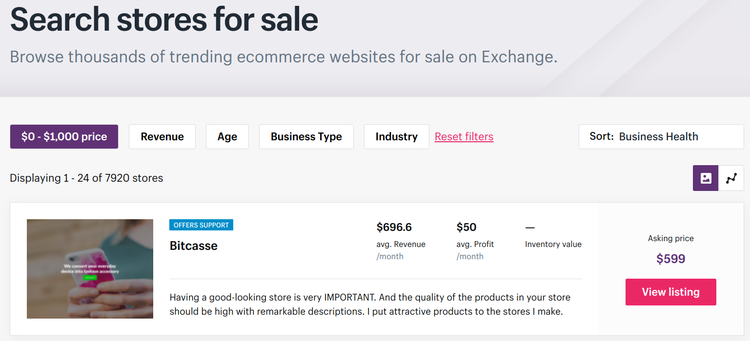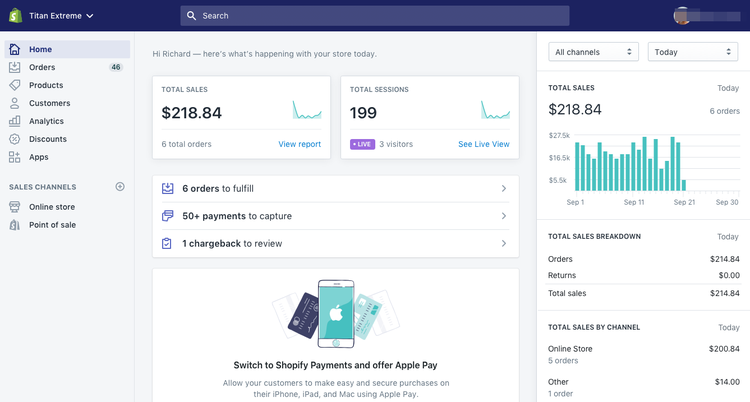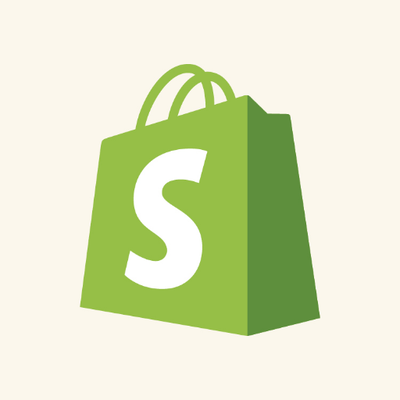As a small business owner, you must use multiple sales channels to maximize revenue. So, while you may have been concentrating on face-to-face sales as you built your operation up, you also need to offer online sales to leverage social commerce and grow your customer base.
If you're ready to make the leap into e-commerce sales, two of the best e-commerce platforms are Shopify and Etsy. We'll go over their respective features and pricing below, so you can select the best one for your needs.
Shopify vs. Etsy: An overview
You'll want to choose your e-commerce provider carefully given the amount of setup time required by even the most user-friendly platforms.
That means considering where you are right now as well as your anticipated sales six months or a year in the future. Only then can you determine your optimal choice in the Etsy vs. Shopify matchup.
Who is Shopify for?
The Ascent's in-depth Shopify review shows this robust e-commerce platform provides a variety of options and features for small-to-mid-size businesses.
In addition, if you're already doing cash or check in-person sales, it has a point of sale (POS) system to easily integrate all your payments. With multiple pricing tiers, you can begin with a relatively small operation but, when needed, handle hundreds or even thousands of transactions per minute.
Who is Etsy for?
As one of your Shopify alternatives, Etsy started as an online marketplace for handmade crafts, and that's still its primary mission even as it's transitioned to a multifaceted e-commerce platform.
While it has added the ability for sellers to work with third-party manufacturers and fulfillment providers in recent years, it has retained its three core product categories: handcrafted and vintage items, at least 20 years old, as well as crafting supplies.
Despite adding functionality since its founding in 2005, it's still primarily for smaller operations.
Shopify vs. Etsy: Features
At a basic level, Shopify and Etsy offer the same capabilities: online sales and inventory management. Beyond that, however, distinct differences surface between the two in terms of advanced functionality as well as the ability to scale up as your sales increase.
What Shopify offers
If you have big plans for your online sales, Shopify's features will provide the means to ramp up quickly and turbocharge your conversion funnel.
In addition to your online e-commerce site, you'll be able to access other sales channels. As noted above, if you already do face-to-face sales, you can use Shopify POS to bundle all your credit card transactions within one system.
Plus, Shopify is designed for easy integration with both Facebook and Instagram, so you can sell your products there too. If you're already selling on Amazon, you can manage those products as well as those on Shopify from a single interface.
Shopify's reporting features provide you with the information you need to make smart business decisions.
In addition to basic info such as sales over specific time periods, you can break out sales by other e-commerce key performance indicators (KPI) such as individual products, sales channels, average revenue per order, currency, discounts, and returns.
This will all help you generate actionable business intelligence to determine customer lifetime value as well as contribute to the product development process.

The multifaceted Shopify sales dashboard provides a wealth of actionable insights. Image source: Author
Want to hit the ground running? Use Shopify Exchange to buy an existing store. If you're interested in this option, you can filter the stores for sale by price, monthly revenue, age, business type, and industry in the Shopify marketplace.

No matter what kind of existing online store you'd like to buy, you can likely find one at Shopify Exchange. Image source: Author
What Etsy offers
Etsy is geared more toward small businesses or sole proprietorships that are selling on a small scale. While its features are less robust, they are also easy to use. In addition, instead of a standalone website for your store, you'll have a storefront at Etsy's website.
That is, Etsy is more like a craft fair where vendors have tables set up under one roof than having your own store.
One big plus is the amount of traffic you can potentially receive from Etsy's homepage, thanks to its prominently displayed search bar. In terms of website traffic, Etsy is one of the most highly ranked in the world, consistently in the top 150 globally, which can help lower your cost per acquisition for each new customer.

The search bar at the top of Etsy's homepage will help drive traffic to your storefront. Image source: Author
There is an add-on option called Etsy Pattern that allows you to set up your own e-commerce website. This will not replace your Etsy storefront but will supplement it. You can also drive sales through Facebook, although you'll need at least one third-party application to do that.
When it comes to sales reports and analytics, it's easy to be overwhelmed by the amount of data available. Etsy sticks to the basics that you absolutely need to know: traffic, product listings, and customers as well as visits and revenue.

The Etsy sales reports provide uncluttered, easy-to-read information. Image source: Author
Results
Shopify is definitely the winner in this category. It offers more features than Etsy to increase revenue through its multiple sales channels and offers more robust reporting features to help formulate your business strategy.
Shopify vs. Etsy: Support
When you make the move into e-commerce, you're going to need a lot of customer support; it's critical. Even if you have a background in website design and development, and especially if you don't, you'll definitely need some help as you work through all the multiple layers of setup details.
What Shopify offers
Shopify offers five means of customer support:
- 24/7 support team availability by chat, email, and phone
- Shopify Help Center with user guides, answers to commonly asked questions, and tutorials
- Shopify-approved experts for e-commerce design, development, and marketing
- Discussion forums
- An online Shopify community called Ecommerce University
What Etsy offers
Etsy sellers can reach out for help in four ways:
- Customer support by phone or email
- The Etsy Success newsletter with tips to improve your shop
- The continually updated Etsy Seller Handbook
- Community forums
Results
Both Shopify and Etsy have the resources you'll need to get started and keep your site running smoothly. Shopify's 24/7 chat feature and access to e-commerce experts, however, gives them a slight advantage in this area.
Shopify vs. Etsy: Ease of use
Ease of use is especially important because, face it, you want to spend your days making sales and growing your customer base as opposed to learning and navigating your e-commerce system.
What Shopify offers
The Shopify dashboard is simple and packed with useful information: the menu in the left column breaks out the different areas you'll need to access, including orders, products, and analytics, and additional panes show total sales, customer sessions, and sales by channel.

All your need-to-know Shopify account information is accessible from the dashboard. Image source: Author
Advanced features include e-commerce email marketing integration, inventory management, and more granular reporting, all valuable tools, but ultimately creating a steeper learning curve.
What Etsy offers
The Etsy account dashboard offers information similar to Shopify's: access to orders, product listings, and customer statistics. At the same time, what you see is what you get because there are not that many advanced features.
Instead, you'll need to use third-party integrations to further customize your e-commerce abilities.
For sheer simplicity, Etsy pricing comes out on top here. Shopify pricing ramps up quickly -- its $79/month plan is what you'll likely need to choose if you have more than minimal online sales. And Etsy offers more competitive pricing to access its features.
The Etsy dashboard is similar to Shopify's but provides more barebones information.
Etsy's stripped-down design also contributes to its ease of use: There is less to learn, so you'll be up and running more quickly.
Results
Etsy is definitely the winner in this category. Shopify's more complex design is meant to allow you to scale up over time as your sales increase, but Etsy's online store builder and dashboard interface are built to be, and remain, simple to use.
Shopify vs. Etsy: Pricing
With pricing, you want to be especially vigilant. You can't choose a plan that leaves you needing more features, but you also don't want to pay for options you're not going to use any time soon.
And don't forget, in addition to the cost of a monthly subscription, you'll also have transaction fees for each sale you make.
What Shopify offers
Shopify offers five plans, all of which come with unlimited customer support:
- Shopify Lite ($9/month) -- You can process sales on your own website or through Facebook. Shopify takes 2.9% of each online transaction plus another $0.30.
- Basic Shopify ($29/month) -- You'll have a Shopify website and the same transaction fees as Shopify Lite. You can also have two employee accounts and the ability to use discount codes.
- Shopify ($79/month) -- Transaction fees drop to 2.6% plus $0.30 per online transaction. You'll get all the Basic Shopify features along with five employee accounts and the ability to use gift cards.
- Advanced Shopify ($299/month) -- This plan reduces transaction fees to 2.4% for online sales plus $0.30 per online transaction. You'll be able to dramatically scale up your sales abilities with 15 employee accounts and advanced reporting capabilities.
- Shopify Plus -- Designed for high-volume sales up to thousands of transactions per minute, Shopify fees and other costs for this quote-based plan depend on the particular needs of each individual merchant.
What Etsy offers
Etsy fees are the same for all their plans: 5% per transaction plus $0.25 for payment processing and an additional 3% commission. The commission fee will be 12% to 15% per transaction, however, for sales resulting from Etsy's offsite ads.
There's also a recurring $0.20 per product listing fee every four months, which will encourage you to keep a close eye on the product life cycle.
Etsy then offers these three plans:
- Etsy Standard -- There's no cost beyond the listing, transaction, and advertising fees that apply to all plans.
- Etsy Plus ($10/month) -- This plan includes a monthly budget of credits for listings and Etsy Ads, a discount for a custom web address for your Etsy shop, advanced shop customization options, and access to discounts on custom packaging and promotional materials.
- Etsy Pattern ($15/month) -- This add-on service allows you to have an e-commerce site using your own domain name and comes in addition to your Etsy storefront.
Results
Shopify vs. Etsy: Integration with other software
No e-commerce platform is an island, and none of them can do absolutely everything you require. Instead, you'll find yourself needing to use one or more third-party apps, plug-ins, or integrations to provide the exact capabilities you need.
One note of caution: While some apps are free or have a free trial period, you'll have to buy many of them, and some may also have a monthly subscription fee.
What Shopify offers
Thanks to the large scale at which Shopify operates with its upper-tier plans, it has a correspondingly robust app store with over 4,000 of its own and third-party options available.
Need help with your store's design? You can choose from 1,793 apps to help with that. And there are hundreds more to aid your e-commerce marketing, orders and fulfillment, finances, reporting, productivity, and inventory turnover ratio.
Plus, you can see all the available apps before you sign up for a Shopify plan to make sure you'll be able to do exactly what you need to do.

If there's something you need done that Shopify doesn't already do, you can likely find an app for it in the Shopify App Store. Image source: Author
What Etsy offers
As noted above, one of Etsy's strengths is its strictly basic functionality that provides an easy learning curve. At the same time, that means you'll need to use multiple add-on apps to customize it for your needs.
For example, while Shopify comes with Shopify POS for in-person sales, you'll have to use Square in conjunction with Etsy to do the same thing.
At the same time, one frustrating thing about Etsy is that you must create an account and set up your storefront before you can access available apps and integrations.
To see what they offer without having to sign up first, you'll need to search online for one of the many articles that detail Etsy's most popular apps.
Results
Hands down, Shopify is the winner in this category. The up-front transparency of its available apps in addition to their wide range of capabilities is far superior to Etsy's "create your store and then we'll show you what else you can use" approach.
How They Compare: Shopify vs. Etsy
| Shopify | Etsy | |
| Features |
|
|
| Support |
|
|
| Ease of use |
|
|
| Pricing |
|
|
| Integration with other software |
|
Go big, go Shopify
In the end, despite Etsy's being less expensive and easier to use out of the box, Shopify comes out on top. That's because when you choose an e-commerce platform, you need one that will work for you now as well as scale up as your sales grow.
On both counts, Shopify outperforms Etsy. Sure, if you have a small operation that you want to keep small, Etsy could be a viable option. But, if you plan to dramatically increase your sales, Shopify is the platform that will best serve your needs.


Our Small Business Expert
We're firm believers in the Golden Rule, which is why editorial opinions are ours alone and have not been previously reviewed, approved, or endorsed by included advertisers. The Ascent does not cover all offers on the market. Editorial content from The Ascent is separate from The Motley Fool editorial content and is created by a different analyst team.